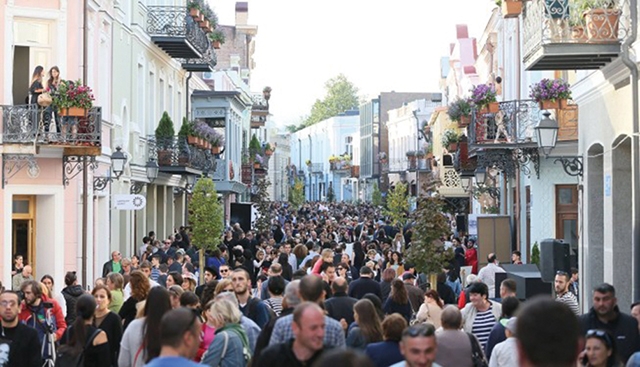Poll Shows Georgian Support for NATO & EU Up but Trust in Gov’t Down
The International Republican Institute (IRI) has released the results of their poll, conducted September 11 - October 14, 2019, which showed that dissatisfaction with the government has been growing in Georgia.
“The (IRI) national poll conducted in Georgia since the anti-Russia protests in June 2019 indicates a continued deficit of trust in the government. No party has a clear lead in the upcoming election, but there is potential to make headway with voters by addressing economic issues, which continue to be the top national concern for citizens,” the organization stated.
Steve Nix, IRI’s Regional Director for Eurasia, says that the party leadership has the opportunity to develop detailed programs and platforms that respond to issues that voters find most pressing.
“The economy and unemployment have been high-ranking concerns for Georgian residents for nearly a decade, but these issues are not present in the country’s political party discourse,” he stated.
The results of the poll revealed that the most untrustworthy institutions in Georgia are the President’s office (70%), the political parties (63%) and the parliament (61%), while the most trusted institutions are the army (86%), the Church (85%) and the media (72%).
In regard to the overall situation in the country, 68% of respondents said they believe that the country is going in the wrong direction, whilst only 22% were convinced that it is going in the right direction.
Eighty percent of respondents ranked economic concerns such as unemployment, the cost of living and poverty as their top national concerns.
“These issues are the most prevalent concerns at the personal level as well, with 50% of respondents claiming unemployment, low salaries, poverty and the general economy are their largest concerns at home. Moreover, the majority of respondents (59%) identify economic issues as having the greatest potential to stymie democratic development in Georgia,” IRI reports.
The political issue which made the most gains during the past year was freedom of speech (34% of those questioned consider it to have progressed), while the economy was considered the area where the country had mostly regressed (66%).
The organization says that earlier this year, the government promised to change the parliamentary system from mixed proportional and majoritarian to fully proportional. 78% of Georgians who are aware of the proposed change to a fully proportional system for parliamentary elections are in favor of the proposed switch. Additionally, 58% of all Georgians surveyed believe that a change to a fully proportional parliamentary list would positively affect Georgia’s democratic development.
“With elections less than a year away, a clear front-runner has yet to emerge. Because 6% of voters are focused on economic policies in the run-up to the election and a third are undecided on their first choice, the political parties that develop coherent and appealing economic platforms will be best positioned to form a parliamentary majority,” IRI said.
The most favorable political figures in the country, according to the survey, are the leader of the opposition party European Georgia David Bakradze (57%), Tbilisi Mayor Kakha Kaladze (49%) and the leader of the Development Movement David Usupashvili (47%).
Meanwhile, the most unpopular political figures in the country according to the polls were President Salome Zurabishvili (70%), leader of the Girchi party Zurab Japaridze (66%), and leader of the Russia-affiliated Alliance of Patriots Irma Inashvili (59%).
Regarding the political parties in the country, the poll revealed that the ruling Georgian Dream is still the most popular party in the country, with 23% of those questioned regarding it as their first choice, followed by the United National Movement (15%), European Georgia (5%), Labor Party (5%) and Alliance of Patriots (4%). 23% of Georgians said they were undecided who to vote for in the parliamentary elections.
In the field of Georgia’s international relations, Russia was perceived as the biggest foreign political threat to Georgia (83%) and 72% of those interviewed said they believed that Russia represents a threat for Georgia economically too. 77% of the respondents also underlined that the Russian aggression on the territories of Georgia is still underway.
In addition to this, 52% of respondents considered the United States to be the most important political and economic partner to Georgia, followed by the EU (50%), Ukraine (32%), Turkey (24%) and Azerbaijan (22%).
Public support for NATO and EU membership within Georgia has increased in the last six months from 68% to 71%, and 75% to 80%, respectively.
“This support appears to be motivated by the perceived security and economic benefits associated with NATO and the EU,” IRI says.
By Tea Mariamidze
Image source: city.kvira.ge












